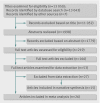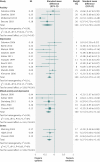Change in mental health after smoking cessation: systematic review and meta-analysis
- PMID: 24524926
- PMCID: PMC3923980
- DOI: 10.1136/bmj.g1151
Change in mental health after smoking cessation: systematic review and meta-analysis
Erratum in
- BMJ. 2014;348:g2216
Abstract
Objective: To investigate change in mental health after smoking cessation compared with continuing to smoke.
Design: Systematic review and meta-analysis of observational studies.
Data sources: Web of Science, Cochrane Central Register of Controlled Trials, Medline, Embase, and PsycINFO for relevant studies from inception to April 2012. Reference lists of included studies were hand searched, and authors were contacted when insufficient data were reported.
Eligibility criteria for selecting studies: Longitudinal studies of adults that assessed mental health before smoking cessation and at least six weeks after cessation or baseline in healthy and clinical populations.
Results: 26 studies that assessed mental health with questionnaires designed to measure anxiety, depression, mixed anxiety and depression, psychological quality of life, positive affect, and stress were included. Follow-up mental health scores were measured between seven weeks and nine years after baseline. Anxiety, depression, mixed anxiety and depression, and stress significantly decreased between baseline and follow-up in quitters compared with continuing smokers: the standardised mean differences (95% confidence intervals) were anxiety -0.37 (95% confidence interval -0.70 to -0.03); depression -0.25 (-0.37 to -0.12); mixed anxiety and depression -0.31 (-0.47 to -0.14); stress -0.27 (-0.40 to -0.13). Both psychological quality of life and positive affect significantly increased between baseline and follow-up in quitters compared with continuing smokers 0.22 (0.09 to 0.36) and 0.40 (0.09 to 0.71), respectively). There was no evidence that the effect size differed between the general population and populations with physical or psychiatric disorders.
Conclusions: Smoking cessation is associated with reduced depression, anxiety, and stress and improved positive mood and quality of life compared with continuing to smoke. The effect size seems as large for those with psychiatric disorders as those without. The effect sizes are equal or larger than those of antidepressant treatment for mood and anxiety disorders.
Conflict of interest statement
Competing interests: All authors have completed the ICMJE uniform disclosure form at
Figures



Comment in
-
Quitting smoking is associated with long term improvements in mood.BMJ. 2014 Feb 17;348:g1562. doi: 10.1136/bmj.g1562. BMJ. 2014. PMID: 24534077 No abstract available.
-
Authors' reply to Sanderson and colleagues.BMJ. 2014 Mar 10;348:g2031. doi: 10.1136/bmj.g2031. BMJ. 2014. PMID: 24614641 No abstract available.
-
Article does not prove that smoking cessation has an "effect" on mental health.BMJ. 2014 Mar 10;348:g2018. doi: 10.1136/bmj.g2018. BMJ. 2014. PMID: 24615004 No abstract available.
-
[Benefits of smoking cessation for mental health].Rev Prat. 2014 Dec;64(10):1361. Rev Prat. 2014. PMID: 25665311 French. No abstract available.
References
-
- World Health Organization. WHO report on the global tobacco epidemic. WHO, 2011.
-
- Lightwood J, Collins D, Lapsley H, Novotny T. Tobacco control in developing countries. Section 1: Tobacco use and its consequences: estimating the costs of tobacco use. World Bank, 2000.
-
- US Department of Health and Human Services. The health consequences of smoking: a report of the Surgeon General. US Department of Health and Human Services, 2004.
-
- US Department of Health and Human Services. The health benefits of smoking cessation. US Department of Health and Human Services, 1990.
Publication types
MeSH terms
Grants and funding
LinkOut - more resources
Full Text Sources
Other Literature Sources
Medical
Miscellaneous
